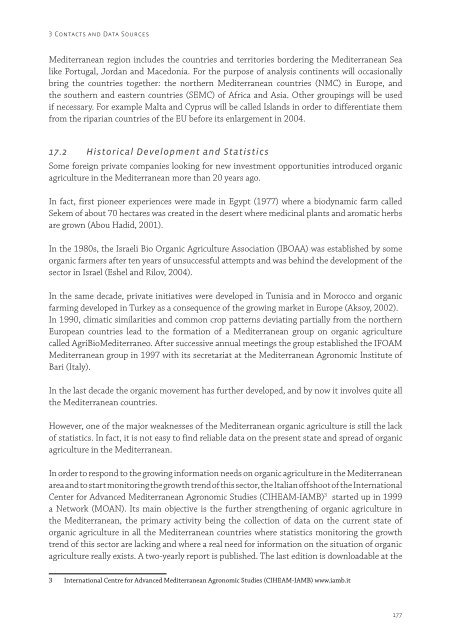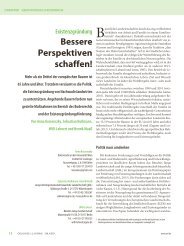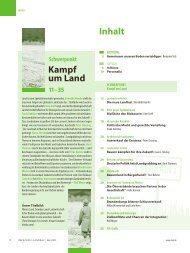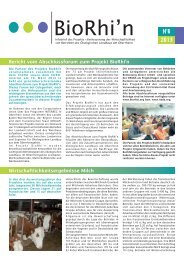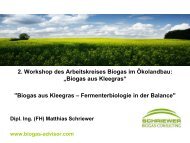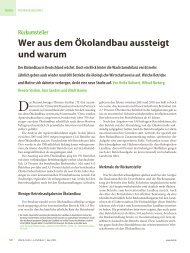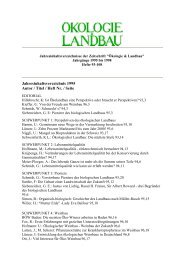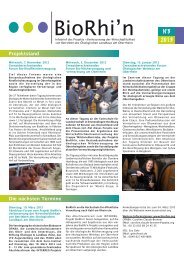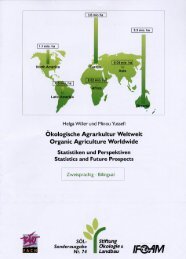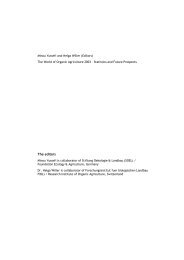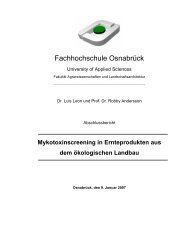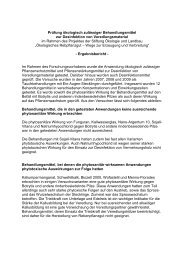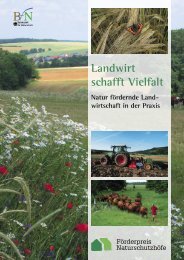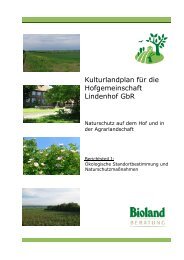the world of organic agriculture - Organic Eprints
the world of organic agriculture - Organic Eprints
the world of organic agriculture - Organic Eprints
You also want an ePaper? Increase the reach of your titles
YUMPU automatically turns print PDFs into web optimized ePapers that Google loves.
3 Contacts and Data Sources<br />
Mediterranean region includes <strong>the</strong> countries and territories bordering <strong>the</strong> Mediterranean Sea<br />
like Portugal, Jordan and Macedonia. For <strong>the</strong> purpose <strong>of</strong> analysis continents will occasionally<br />
bring <strong>the</strong> countries toge<strong>the</strong>r: <strong>the</strong> nor<strong>the</strong>rn Mediterranean countries (NMC) in Europe, and<br />
<strong>the</strong> sou<strong>the</strong>rn and eastern countries (SEMC) <strong>of</strong> Africa and Asia. O<strong>the</strong>r groupings will be used<br />
if necessary. For example Malta and Cyprus will be called Islands in order to differentiate <strong>the</strong>m<br />
from <strong>the</strong> riparian countries <strong>of</strong> <strong>the</strong> EU before its enlargement in 2004.<br />
17.2 Historical Development and Statistics<br />
Some foreign private companies looking for new investment opportunities introduced <strong>organic</strong><br />
<strong>agriculture</strong> in <strong>the</strong> Mediterranean more than 20 years ago.<br />
In fact, first pioneer experiences were made in Egypt (1977) where a biodynamic farm called<br />
Sekem <strong>of</strong> about 70 hectares was created in <strong>the</strong> desert where medicinal plants and aromatic herbs<br />
are grown (Abou Hadid, 2001).<br />
In <strong>the</strong> 1980s, <strong>the</strong> Israeli Bio <strong>Organic</strong> Agriculture Association (IBOAA) was established by some<br />
<strong>organic</strong> farmers after ten years <strong>of</strong> unsuccessful attempts and was behind <strong>the</strong> development <strong>of</strong> <strong>the</strong><br />
sector in Israel (Eshel and Rilov, 2004).<br />
In <strong>the</strong> same decade, private initiatives were developed in Tunisia and in Morocco and <strong>organic</strong><br />
farming developed in Turkey as a consequence <strong>of</strong> <strong>the</strong> growing market in Europe (Aksoy, 2002).<br />
In 1990, climatic similarities and common crop patterns deviating partially from <strong>the</strong> nor<strong>the</strong>rn<br />
European countries lead to <strong>the</strong> formation <strong>of</strong> a Mediterranean group on <strong>organic</strong> <strong>agriculture</strong><br />
called AgriBioMediterraneo. After successive annual meetings <strong>the</strong> group established <strong>the</strong> IFOAM<br />
Mediterranean group in 1997 with its secretariat at <strong>the</strong> Mediterranean Agronomic Institute <strong>of</strong><br />
Bari (Italy).<br />
In <strong>the</strong> last decade <strong>the</strong> <strong>organic</strong> movement has fur<strong>the</strong>r developed, and by now it involves quite all<br />
<strong>the</strong> Mediterranean countries.<br />
However, one <strong>of</strong> <strong>the</strong> major weaknesses <strong>of</strong> <strong>the</strong> Mediterranean <strong>organic</strong> <strong>agriculture</strong> is still <strong>the</strong> lack<br />
<strong>of</strong> statistics. In fact, it is not easy to find reliable data on <strong>the</strong> present state and spread <strong>of</strong> <strong>organic</strong><br />
<strong>agriculture</strong> in <strong>the</strong> Mediterranean.<br />
In order to respond to <strong>the</strong> growing information needs on <strong>organic</strong> <strong>agriculture</strong> in <strong>the</strong> Mediterranean<br />
area and to start monitoring <strong>the</strong> growth trend <strong>of</strong> this sector, <strong>the</strong> Italian <strong>of</strong>fshoot <strong>of</strong> <strong>the</strong> International<br />
Center for Advanced Mediterranean Agronomic Studies (CIHEAM-IAMB) 3 started up in 1999<br />
a Network (MOAN). Its main objective is <strong>the</strong> fur<strong>the</strong>r streng<strong>the</strong>ning <strong>of</strong> <strong>organic</strong> <strong>agriculture</strong> in<br />
<strong>the</strong> Mediterranean, <strong>the</strong> primary activity being <strong>the</strong> collection <strong>of</strong> data on <strong>the</strong> current state <strong>of</strong><br />
<strong>organic</strong> <strong>agriculture</strong> in all <strong>the</strong> Mediterranean countries where statistics monitoring <strong>the</strong> growth<br />
trend <strong>of</strong> this sector are lacking and where a real need for information on <strong>the</strong> situation <strong>of</strong> <strong>organic</strong><br />
<strong>agriculture</strong> really exists. A two-yearly report is published. The last edition is downloadable at <strong>the</strong><br />
3 International Centre for Advanced Mediterranean Agronomic Studies (CIHEAM-IAMB) www.iamb.it<br />
177


